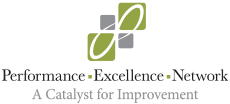Before March, things were already changing at an accelerating pace, as customers demand more, competition increases, and technology has exploded. But with the onset of the pandemic the pace (and unpredictability) of change has only increased. The next year or two (or three or four) promises more of the same. But there are models, tools, and best practices for navigating this change. Those that manage change proactively and systematically will perform better than those forced to change reactively.
The Performance Excellence Network is pleased to host an online webinar discussion on Thursday, October 15: “Managing the Accelerating (& Unpredictable) Pace of Change.” The discussion will feature three speakers, each exploring different approach(es) to help leaders and professionals manage change.
Each presentation will be approximately 15 minutes (PEN’s own version of a TedTalk!), followed by facilitated Q&A and discussion of all three speakers at the end of the session. The speakers and topics include (details below):
- Mike Stoecklein of Institute for Enterprise Excellence (IEX), exploring “Using Cynefin Sense-Making Framework in Change Management”
- Kevin Anderson on “What if You Could Only Select 3 Tools?”
- Dan Olson of Prosci on “Using ADKAR to Drive Change”
Come explore how to better navigate change within your team and organization.
The discussion will be a live Zoom Webinar Thursday, October 15 from 8:00-9:00 CT. Grab your coffee and breakfast, and join us for a rich discussion. Free for PEN members; $20 for non-members.
Discussion Details
“Using Cynefin Sense-Making Framework in Change Management”
Understanding the situation you are in (the context) is the first step to successfully navigating change. Most people don’t understand this. It’s not their fault – they tend to view and treat all situations the same (largely based on “popular systems thinking” introduced in the 1980s and still dominant today). The Cynefin sense-making framework (developed by Dave Snowden, Cognitive Edge) provides a landscape to view your current situation, and to navigate toward a desired future state. The framework is based upon science principles including: complexity, anthropology, neuroscience and evolution. It is based on the fact that there are three types of systems in nature: complex, ordered and chaotic. The Cynefin framework divides “ordered” into two domains – clear and complicated. The fifth domain (in the center of the framework) is the domain of not knowing where you are. The Cynefin framework works as a “categorization” framework (where am I at?) but also provides guidance for how to move between domains. Three important points (rules) will be emphasized in this brief webinar: Rule 1 – Not all situations are the same (context matters), Rule 2 – The correct action changes based upon the situation, and Rule 3 – Managing change requires knowledge about how to navigate between domains. Resources for learning more about the Cynefin sense-making framework will be provided. At the end of the discussion, participants will gain deeper appreciation of “context” when managing change.
Change Management Case Study: What if You Could Only Select 3 Tools?
Dr. Kevin Anderson will focus his discussion on the following key points:
- What is change management? This is really about people readiness.
- The 3 essential change tools: Stakeholder analysis, business impact, gap analysis
- Some tips and techniques – how to execute on change in reality
Kevin is a leading expert in organizational design and performance, leadership, change management, and cultural initiatives. Kevin has over twenty-five years of experience in designing and delivering high impact, global organizational solutions in public and private organizations. He is currently a senior organizational development consultant at a global agribusiness company. Kevin has a Doctorate in Organizational Leadership, Policy from the University of Minnesota.
Using ADKAR to Drive Change
The Prosci ADKAR® Model is a goal-oriented change management model that guides individual and organizational change. Created by Prosci founder Jeff Hiatt, ADKAR is an acronym that represents the five tangible and concrete outcomes that people need to achieve for lasting change: awareness, desire, knowledge, ability and reinforcement.
Dan Olson will explore how ADKAR helps us outline the goals and outcomes of successful change, thereby becoming an effective tool for planning change management activities, equipping your leaders facilitating change, and supporting your employees throughout the change. He will demonstrate how ADKAR can be used to navigate today’s extraordinary challenges, helping leaders manage the pace and success of change efforts.



